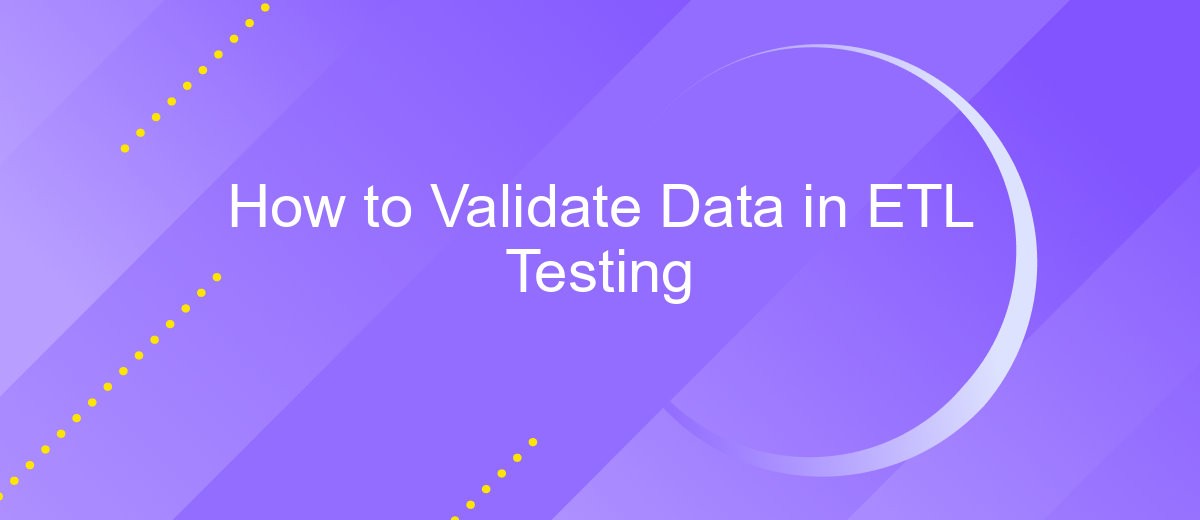How to Validate Data in ETL Testing
Validating data in ETL (Extract, Transform, Load) testing is crucial for ensuring data integrity and accuracy throughout the data pipeline. This process involves verifying that data is correctly extracted from source systems, accurately transformed according to business rules, and properly loaded into the target system. In this article, we will explore key methodologies and best practices for effective data validation in ETL testing.
Introduction
ETL (Extract, Transform, Load) testing is a critical process in ensuring the accuracy and reliability of data as it moves from source to destination. Proper validation of data in ETL testing helps to identify and rectify errors early, ensuring the integrity of the data pipeline. This process is essential for businesses that rely on data-driven decision-making.
- Data extraction validation: Ensuring data is correctly extracted from source systems.
- Data transformation validation: Verifying that data transformations are accurate and meet business rules.
- Data loading validation: Confirming that data is correctly loaded into the target systems.
Effective ETL testing requires a combination of automated tools and manual processes. Services like ApiX-Drive can facilitate seamless integration and data transfer between various systems, simplifying the validation process. By leveraging such tools, organizations can enhance the efficiency and accuracy of their ETL testing, ensuring that their data remains consistent and reliable across all platforms.
Data Validation Techniques

Data validation in ETL testing ensures that the data being extracted, transformed, and loaded is accurate, complete, and reliable. One common technique is data profiling, which involves analyzing the data from source systems to understand its structure, content, and quality. This helps in identifying any anomalies, missing values, or inconsistencies that need to be addressed before the data is processed further. Another key technique is the use of data validation rules, which are predefined conditions that the data must meet. These rules can be implemented at various stages of the ETL process to ensure that the data adheres to the required standards and business logic.
Automated tools and services like ApiX-Drive can significantly streamline the data validation process. ApiX-Drive allows for seamless integration with various data sources, enabling real-time data validation and monitoring. By setting up automated workflows, ApiX-Drive ensures that any discrepancies or errors are promptly identified and rectified, reducing the risk of data quality issues. Additionally, it provides detailed logging and reporting features that help in tracking the validation process and maintaining data integrity throughout the ETL lifecycle.
ETL Data Validation

ETL data validation is a critical process to ensure the accuracy, completeness, and reliability of data as it moves from source to destination. This process involves a series of checks and balances to confirm that data transformations are performed correctly and that the final dataset meets the required standards.
- Data Completeness Check: Ensure that all expected data is loaded into the target system without any loss.
- Data Accuracy Check: Verify that the data transformation rules are correctly applied and that the data maintains its integrity.
- Data Consistency Check: Confirm that the data remains consistent across different stages of the ETL process.
- Data Uniqueness Check: Ensure that there are no duplicate records in the target dataset.
- Data Timeliness Check: Validate that the data is loaded within the expected time frame.
Using integration services like ApiX-Drive can greatly simplify the ETL data validation process. ApiX-Drive allows for seamless integration between various data sources and target systems, automating many of the validation tasks and ensuring that data flows smoothly and accurately. This helps in maintaining data quality and reduces the manual effort required for ETL testing.
Data Validation Tools

Data validation is a critical step in ETL testing, ensuring the accuracy and integrity of data as it moves from source to destination. Various tools can assist in automating and streamlining this process, reducing manual effort and minimizing errors.
When selecting a data validation tool, consider factors such as ease of use, integration capabilities, and support for various data formats. Some tools offer advanced features like real-time validation, error reporting, and detailed data profiling.
- Talend Data Integration
- Informatica Data Validation
- QuerySurge
- Datameer
- ApiX-Drive
ApiX-Drive is particularly useful for setting up seamless integrations between different systems, ensuring data consistency across platforms. Its user-friendly interface and robust features make it an excellent choice for automating data validation tasks. By leveraging these tools, organizations can enhance the reliability and accuracy of their data pipelines.
Best Practices for Data Validation in ETL Testing
Ensuring data accuracy and consistency in ETL testing requires a structured approach. Begin by defining clear validation rules and criteria to verify data integrity at each stage of the ETL process. Implement automated testing tools to streamline the validation process, reducing human error and increasing efficiency. Regularly update and review these rules to accommodate changes in data sources and business requirements.
Utilize robust data integration platforms like ApiX-Drive to facilitate seamless data transfer and synchronization between various systems. This not only enhances data quality but also simplifies the validation process by providing real-time monitoring and alerts for any discrepancies. Conduct thorough end-to-end testing, including source-to-target data validation, to ensure that data transformations are performed accurately. Maintain detailed documentation of all validation procedures and results to support ongoing data governance and compliance efforts.
FAQ
What is ETL testing and why is data validation important in it?
What are the common types of data validation checks performed in ETL testing?
How can automation improve the efficiency of data validation in ETL testing?
What are some challenges faced during data validation in ETL testing?
How can ApiX-Drive help with data validation in ETL testing?
Do you want to achieve your goals in business, career and life faster and better? Do it with ApiX-Drive – a tool that will remove a significant part of the routine from workflows and free up additional time to achieve your goals. Test the capabilities of Apix-Drive for free – see for yourself the effectiveness of the tool.

